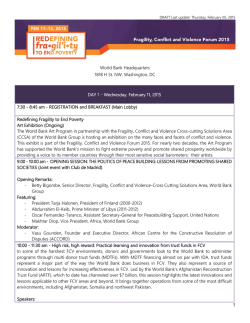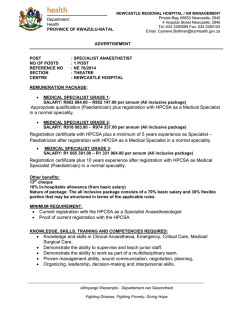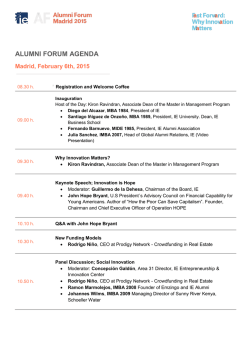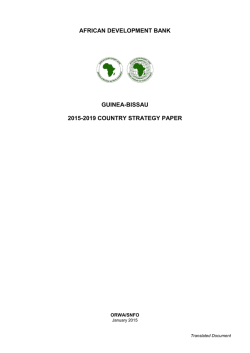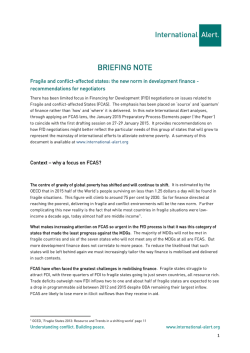
World Bank Headquarters 1818 H St. NW, Washington, DC DAY 1
DRAFT Last update: Thursday, February 05, 2015 World Bank Headquarters 1818 H St. NW, Washington, DC DAY 1 – Wednesday, February 11, 2015 7:30 - 8:45 am - REGISTRATION and BREAKFAST (Main Lobby) Redefining Fragility to End Poverty Art Exhibition (Ongoing) The World Bank Art Program in partnership with the Fragility, Conflict and Violence Cross-cutting Solutions Area (CCSA) of the World Bank Group is hosting an exhibition on the many faces and facets of conflict and violence. This exhibit is part of the Fragility, Conflict and Violence Forum 2015. For nearly two decades, the Art Program has supported the World Bank’s mission to fight extreme poverty and promote shared prosperity worldwide by providing a voice to its member countries through their most sensitive social barometers: their artists. 9:00 - 10:00 am - OPENING SESSION: THE POLITICS OF PEACE BUILDING: LESSONS FROM PROMOTING SHARED SOCIETIES (Joint event with Club de Madrid) Opening Remarks: - Betty Bigombe, Senior Director, Fragility, Conflict and Violence-Cross Cutting Solutions Area, World Bank Group Featuring: - President Tarja Halonen, President of Finland (2000-2012) - Abdurrahim El-Keib, Prime Minister of Libya (2011-2012) - Oscar Fernandez-Taranco, Assistant Secretary-General for Peacebuilding Support, United Nations - Makhtar Diop, Vice President, Africa, World Bank Group Moderator: - Vasu Gounden, Founder and Executive Director, African Centre for the Constructive Resolution of Disputes (ACCORD) 10:00 - 11:30 am - High risk, high reward: Practical learning and innovation from trust funds in FCV In some of the harshest FCV environments, donors and governments look to the World Bank to administer programs through multi-donor trust funds (MDTFs). With MDTF financing almost on par with IDA, trust funds represent a major part of the way the World Bank does business in FCV. They also represent a source of innovation and lessons for increasing effectiveness in FCV. Led by the World Bank’s Afghanistan Reconstruction Trust Fund (ARTF), which to date has channeled over $7 billion, this session highlights the latest innovations and lessons applicable to other FCV areas and beyond. It brings together operations from some of the most difficult environments, including Afghanistan, Somalia and northwest Pakistan. Speakers: 1 DRAFT Last update: Thursday, February 05, 2015 - Ditte Fallesen, Senior Operations Officer, Afghanistan Country Management Unit, World Bank Group - Nicholas Marwell, Operations Officer, Somalia Multi-Partner Fund, World Bank Group - Mehreen Saeed, Communications Officer, Pakistan Multi-Donor Trust Fund, World Bank Group Moderator: - Josef Leitmann, Lead Disaster Risk Management Specialist, Urban, Rural and Social Development Department-Global Practice, World Bank Group 11:30 am - 1:00 pm - Third Party Monitoring: Strengthening the World Bank’s oversight and accountability in a challenging security context Third party monitoring (TPM) plays a critical role in managing the World Bank’s US$1.8 billion portfolio (IDA and ARTF) in Afghanistan. In a context characterized by challenging security, remote areas, low capacity and weak governance structures, TPM allows the World Bank to access data from all over the country, benefitting monitoring of both quality of infrastructure, output/outcome results and project effectiveness. Speakers: - Naila Ahmed, Rural Development Specialist, Urban, Rural, and Social Development Department-Global Practice, World Bank Group - Samantha De Silva, Senior Social Protection Specialist, Education Department-Global Practice, World Bank Group - Ajmal Askerzoy, Operations Officer, Transport and ICT Department-Global Practice, World Bank Group - Mohammad Yasin Noori, Social Development Specialist, Urban, Rural, and Social Development Department-Global Practice, World Bank Group - Ditte Fallesen, Senior Operations Officer, Afghanistan Country Management Unit, World Bank Group Moderator: - Hassan Zaman, Senior Adviser, Office of the Vice President for South Asia, World Bank Group 10:00 am - 12:00 pm (noon) - Decentralized governance as a catalyst for peace Decentralization’s capacity to mitigate and solve conflict has been subject to heavy debates in recent years. In some cases decentralization seems to fuel existing conflicts or trigger new ones, whereas in other cases it has contributed to successfully ending conflict. This panel session will bring together thought leaders for a debate on the current trends and merits of decentralized governance as a positive factor in peace processes and efforts to bring about lasting solutions to conflict. Speakers: - Luisito Montalbo, Undersecretary, Executive Director, Office of the Presidential Adviser on the Peace Process, Office of the President of the Philippines - Luka Biong Deng, Director, Centre for Peace and Development Studies, University of Juba, and Fellow, Carr Center for Human Rights Policy, Harvard University - Balakrishna Menon Parameswaran, Program Leader Djibouti, Egypt, and Yemen Country Units, World Bank Group Moderator: - Guenter Heidenhof, Practice Manager, Governance Global Practice, World Bank Group 10:00 - 11:30 am - Developing a conflict-sensitive strategy and portfolio: Lessons from the Kyrgyz Republic The approaches integrated into the Kyrgyz Republic strategies and operations since its 2010 conflict provide an excellent case from which to draw lessons on a portfolio and CMU-wide approach to conflict sensitivity. The case also provides a robust example of collaboration between conflict specialists in social development, country management, and different task teams in integrating conflict sensitivity into the overall work program of the World Bank in a country context. This practitioner’s clinic will present lessons learned from the Kyrgyz case, undertake a simulation exercise to show how a Conflict Filter approach can be applied to an operation, and 2 DRAFT Last update: Thursday, February 05, 2015 provide an opportunity for facilitated small-group discussions on how the Kyrgyz experience can be extended to other country cases with comparable needs. Speakers: - Alexander Kremer, Country Manager for Moldova and former Country Manager for the Kyrgyz Republic, Chisinau (Moldova), World Bank Group Facilitators: - Aly Zulficar Rahim, Senior Social Development Specialist and original Task Team Leader (TTL) for the Kyrgyz Republic Conflict Filter, Urban, Rural and Social Development Department – Global Practice, World Bank Group - Asli Gurkan, Social Development Specialist and current TTL for the Kyrgyz Republic Conflict Filter, Urban, Rural and Social Development Department – Global Practice, World Bank Group - Monica Stephen, Head of International Institutions, International Alert Discussant: - Nikolas Myint, Senior Social Development Specialist (Myanmar), Urban, Rural and Social Development Department-Global Practice, Yangon (Myanmar), World Bank Group 10:00 - 11:30 am - Using results measurements to enhance the effectiveness and learning of private sector interventions in FCV In fragile situations, the threat of resurging conflict, high uncertainty about conditions of doing business, and a fragile institutional environment make private investment and private sector development (PSD) project challenging. It is even more challenging in conducting monitoring and evaluation activities in FCV. The objective of this session will share several IFC initiatives and experience in applying various result measurements approaches that help the institution and projects improve the design, effectiveness and learning of PSD interventions in FCV. It also aims to serve a platform for discussion and debate on the potential contribution of the PSD interventions to the peace and stability. Speakers: - Luba Shara, Senior Results Measurement Specialist, Global Economy & Strategy, Development Impact Department-Advisory Services, Johannesburg (South Africa), International Finance Corporation, World Bank Group - Chaoying Liu, Results Measurement Specialist, Global Economy & Strategy, Development Impact Department-Advisory Services, International Finance Corporation, World Bank Group Moderator: - Toshiya Masuoka, Director, Global Economy & Strategy, Development Impact Department-Advisory Services, International Finance Corporation, World Bank Group 10:00 - 11:30 am - New approaches to justice in FCV New approaches to promoting institutions that deliver justice in FCV have important implications for World Bank operations. These approaches grapple with the political and social context that shapes the delivery of justice. It calls for an understanding of justice that goes beyond justice sector institutions, to a broader set of sectors and public authorities that more directly shape citizen experiences of grievance and justice. Thus, interventions on land, extractives, service delivery, public spending, infrastructure etc., can be crucial vehicles to promoting institutions that produce just outcomes. Implications for justice sector work are explored through case examples of Somalia, Solomon Islands, Timor-Leste, Nigeria, and Liberia. Speakers: - Gerald Gahima, Judge, War Crimes Chamber, Court of Bosnia-Herzegovina - Nigel Roberts, International Development Expert 3 DRAFT Last update: Thursday, February 05, 2015 - Katy Thompson, Policy Advisor, Rule of Law, Justice, and Security, United Nations Development Programme - Deborah Hannah Isser, Senior Governance Specialist, Governance Department-Global Practice, World Bank Group Moderator: - Rachel Kleinfeld, Senior Associate, Democracy of Rule of Law Program, Carnegie Endowment for International Peace 10:00 - 11:30 am - More than the sum of the parts: The security-development nexus As leaders, practitioners and analysts take stock of past successes and failures in post-conflict re-engagement, mutual reinforcement across the four main communities of practice - diplomacy, security, relief and development - is consistently identified as critical to success in peace consolidation and recovery. Experience shows that in the absence of deterrence against hostile elements, a credible peace agreement can rarely be forged. A viable peace agreement rarely holds, absent a credible humanitarian relief effort restoring basic human dignity. Finally, gains from an effective security, diplomatic and humanitarian effort can be reversed, plunging society back into conflict, if true development does not follow, i.e., reconstruction (physical and institutional) towards shared growth, better economic prospects. Against this background, the panel session will focus specifically on the dynamics that link security and development in conflict and post-conflict settings, drawing on recent experience. The ultimate objective of the session is to engage Bank staff operating in FCS on the topic of the nexus between security and development, drawing on recent examples and reinforcing the need to reflect that nexus in the conception, design and planning of the Bank’s future post-conflict re-engagement strategies at the institutional and country levels. Moderator: - Luigi Giovine, Lead Operations Officer, Fragility, Conflict and Violence-Cross Cutting Solutions Area, World Bank Group Speakers: - Jordan Ryan, former Assistant Secretary General, Deputy Special Representative of the Secretary-General, Resident Coordinator, Humanitarian Coordinator, United Nations Development Programme, United Nations Mission in Liberia - Burcu San, Head of Operational Preparedness Operations Division, International Staff, North Atlantic Treaty Organization Headquarters - Michael Miller, European External Action Service, Deputy Division Head, Conflict Prevention, Peace Building and Mediation Instruments, European Union - Brigadier Flemming Kent Vesterby Agerskov, Denmark’s Army, Director Combined Joint Interagency Task Force-Shafafiyat, North Atlantic Treaty Organization 11:00 am - 12:00 pm – The Sahara: Key to the stability and development of Northern Africa and the Sahel A cross-regional and cross-sectorial exchange that focuses on the linkages between security, governance and development in the Sahara, articulating the dynamics that are leading to increased instability (armed violence and trafficking), describing the opportunities that can be capitalized upon to develop operational initiatives (trade, extractives and pastoralism), and identifying areas where further research is needed. Speakers: - Mark Shaw, Global Initiative against Transnational Organized Crime/UCT - Yvan Guichaoua, Lecturer in Politics and International Development, School of International Development, University of East Anglia - Jeremy Swift, Pastoral Development Specialist and former Fellow, Institute of Development Studies, University of Sussex 4 DRAFT Last update: Thursday, February 05, 2015 - Catalina Quintero, Conflict and Fragility Specialist, Fragility, Conflict and Violence-Cross Cutting Solutions Area, World Bank Group - Taies Nezam, Consultant, Fragility, Conflict and Violence-Cross Cutting Solutions Area, World Bank Group Moderator: - Alexandre Marc, Chief Technical Specialist, Fragility, Conflict and Violence-Cross Cutting Solutions Area, World Bank Group 12:00 (noon) - 1:00 pm - LUNCH Redefining Fragility to End Poverty 12:10 - 12:45 pm - Art Exhibition Walking Tour, Meeting Point: MC Information Desk Join World Bank curator Marina Galvani in a walking tour and conversation which explores a bold, poignant and poetic selection of artwork by artists of fragile states addressing the rampant violence, devastating conflict and ravaging instability of their societies. 1:00 - 4:00 pm – Transitions out of conflict and “inclusive enough” political settlements: emerging lessons and role of the World Bank The World Bank Group is increasingly requested to complement the role and expertise provided by other development actors in the context of political transitions in the aftermath of conflict. While the World Bank has a long history of providing technical assistance and advice in these contexts, the engagements have been ‘under the radar’ and provided limited opportunity for learning lessons over time, and thus no coherent strategy in conceptualizing and engaging in political transitions has emerged. Based on increasing demand by clients and country teams, this mini-conference will bring together experts from the World Bank, UN, the Berghof Foundation, USIP and other external partners to create a platform to exchange knowledge and experience. The session also aims to ‘kick-start’ a conversation between World Bank among those UN actors with the principal mandate to engage on overtly political processes, defining areas of comparative advantage, and developing modalities for co-operation, especially whereby the Bank can mobilize required assistance in areas where it has significant technical expertise. Speakers: - Dr. Véronique Dudouet, Programme Director, Berghof Foundation - Levent Bilman, Director, Policy Mediation Division, Department of Political Affairs, United Nations - Guenther Heidenhof, Practice Manager, Governance Global Practice, World Bank Group - Nikolas Myint, Senior Social Development Specialist, Urban, Rural and Social Development DepartmentGlobal Practice, Myanmar, World Bank Group - Matthew Stephens, Senior Social Development Specialist, Urban, Rural and Social Development Department-Global Practice, Philippines, World Bank Group - Sam Chittick, Advisor, World Bank-United Nations Facility for Advisory Services for Transition Capacities (Southern Philippines) Moderator: - Nigel Roberts, Co-Director of the WDR 2011 on Conflict, Violence, and Development, and former World Bank Country Director 1:30 – 3:30 pm - Going global: Collaborative solutions to reduce interpersonal violence The Violence Prevention Global Beam (VPGB), coordinated by the Global Practice for Social, Urban and Rural Development (GPSURR) will host a knowledge fair with activities across the World Bank that incorporate violence prevention. The structure of this session is designed to promote an environment for networking across the World Bank and to facilitate conversations on opportunities for collaboration. The focus is on interpersonal violence including its relationship to self-inflicted and collected violence. The VPGB will showcase their platform that 5 DRAFT Last update: Thursday, February 05, 2015 promotes and facilitates World Bank-wide collaborations and synergies, and works to expand the investment portfolio on violence prevention. The Knowledge Fair will be open all three days of the FCV Forum. Presenters from the Bank’s Global Practices, Cross-Cutting Solutions Areas and RESOL-V will make informal presentations on: (a) how crime and violence hinders the achievement of important sector outcomes, (b) one concrete solution that the sector is testing, and (c) one other GP with which it needs to collaborate to advance its agenda. * The Beam will support teams in the preparations of their posters. Identifying opportunities for collaborative solutions, participants will move around the room to view posters and label those GP posters that they envision working with. Speakers: - Rodrigo Guerrero Velasco, Mayor of Cali, Colombia - Maninder S. Gill, Director, Urban, Rural and Social Development Department-Global Practice, World Bank Group - Hassane Cisse, Director, Governance Department-Global Practice, World Bank Group Moderator: - Rodrigo Serrano-Berthet, Lead Social Development Specialist, Urban, Rural and Social Development Department-Global Practice, World Bank Group Closing remarks: - Alexandre Marc, Chief Technical Specialist, Fragility, Conflict and Violence-Cross Cutting Solutions Area, World Bank Group 1:00 - 3:00 pm - Data revolutions for better governance of extractive industries in FCV One of the main challenges to good governance of natural resources is a fundamental lack of access to information as well as limited civil society capacity to utilize data to better monitor extractive industry operations. To address these challenges, governments are starting to take pioneering steps and a number of important “data revolutions” are underway. These initiatives seek to improve the generation of accurate and publicly accessible information on extractive industries, as well as provide an evidence-base for community-level monitoring of extractive industry operations. The panel will discuss the potential, as well as limitations, of harnessing data for better extractives outcomes, drawing on early learnings from ongoing data-driven efforts, as well as experiences of community monitoring in DRC, Liberia, and Sierra Leone. Opening remarks: - Emilia Pires, Minister of Finance and Special Envoy to the g7+, Timor-Leste Speakers: - Habib Ur Rehman Mayar, Senior Policy Specialist, g7+ - Dag Seierstad, Senior Expert on Extractive Industries, United Nations Environment Programme PostConflict and Disaster Management Branch, co-Coordinator of MAP-EI partnership - Eddie Rich, Deputy Head and Regional Director for Africa and the Middle East, Extractive Industries Transparency Initiative (EITI) - Jim Cust, Head of Data and Analysis, Natural Resources Governance Institute/CODEX Initiative - Joy Saunders, Chief Executive Officer, Integrity Action - Michael Stanley, Lead Mining Specialist, Energy and Extractives Department-Global Practice, World Bank Group Moderator: - Robert Hunja, Practice Manager, Governance Global Practice, World Bank Group 1:00 - 4:00 pm - Alternatives to camps: Bringing a development response to forced displacement 6 DRAFT Last update: Thursday, February 05, 2015 This session aims to raise awareness of the need for a development response to the challenges of forced displacement and of the role the World Bank is playing in providing support to the displaced. The session will also: (i) raise awareness of UNHCR’s policy on ‘Alternatives to Camps’ with discussion of why a camp environment can be detrimental for refugees and internally displaced persons (IDPs) and why stakeholders are increasingly searching for alternatives, (ii) give the economic case for why alternatives to camps may have better rates of return, (iii) give practical examples of World Bank projects in support of refugees and IDPs that provide alternative models of support other than camps. Speakers: - Steven Corliss, Director of the Division of Program Support & Management, the United Nations High Commissioner for Refugees - Apollo Kazungu, Commissioner, Department of Refugees, Government of Uganda - Sabir Ahmadov, Deputy Director, Azerbaijan Social Fund for the Development of Internally Displaced Persons/ Azerbaijan IDP Living Standards and Livelihoods Project - Namig Ibrahimov, Manager for Livelihoods, Azerbaijan Social Fund for the Development of Internally Displaced Persons/ Azerbaijan IDP Living Standards and Livelihoods Project - Niels V. Harild, Lead Social Development Specialist, Global Program on Forced Displacement, Fragility, Conflict and Violence-Cross Cutting Solutions Area, World Bank Group - Aly Zulficar Rahim, Senior Social Development Specialist and Task Team Leader, Azerbaijan IDP Living Standards and Livelihoods Project, Urban, Rural and Social Development Department-Global Practice, World Bank Group - Ximena Vanessa Del Carpio, Senior Economist, Social Protection and Labor Department, World Bank Group - Zeynep Durnev Darendeliler, Social Development Specialist, Urban, Rural and Social Development Department-Global Practice, World Bank Group Moderator: - Colin Bruce, Director, Africa Regional Integration, World Bank Group 1:00 - 2:30 pm - Evidence 4 Peace: Leveraging impact evaluation tools for better results in FCV contexts Fragile and conflict affected situations face daunting developmental challenges, for which solutions remain elusive. While there is consensus that policy decisions informed by evidence can help to achieve better results on the ground, the evidence base for development interventions designed to address FCV has been quite thin. To begin to address this gap, the World Bank’s FCV Group and the Development Impact Evaluation initiative (DIME), together with external partners International Initiative for Impact Evaluation (3ie) and Innovations for Poverty Action (IPA) recently launched the Evidence 4 Peace (E4P) program with the overall goal of assessing evidence gaps in FCV response, generating improved knowledge about development effectiveness and understanding of how to best support FCV clients in delivering the results so critically needed for citizens to gain confidence in the path out of conflict. Speakers: - Annette N. Brown, Deputy Director, Advancement and Impact Evaluation Services, International Initiative for Impact Evaluation - Macartan Humphreys, Professor, Department of Political Science, Columbia University - Chris Blattman, Associate Professor of Political Science and International Affairs, Columbia University - Marie Gaarder, Manager, Evaluation, Public Sector, World Bank Group - Mary Hallward-Driemeier, Senior Principal Specialist, Jobs-Cross Cutting Solutions Area, World Bank Group 7 DRAFT Last update: Thursday, February 05, 2015 - Eric Mvukiyehe, Economist, Development Economics-Development Impact Evaluation Unit, World Bank Group - Marcus E. Holmlund, Economist, Development Economics-Development Impact Evaluation Unit, World Bank, Group Moderator: - Arianna Legovini, Adviser, Development Economics-Development Impact Evaluation, World Bank Group 1:00 - 2:30 pm - Responding to the challenge of fragility and security in West Africa Since independence, the West Africa sub region has been the arena for various large-scale conflicts and civil wars, as well as low-intensity conflicts. The turn of the millennium witnessed the recession of large-scale and conventional conflict, but ushered in emerging threats. The specter of religious extremism, maritime piracy, and narcotics trafficking threatens to undermine recent progress. This session will examine the challenges of fragility and security in West Africa, along with the factors of resilience. It will investigate key drivers of conflict and violence while exploring how the sub region has become a pioneer on the continent in addressing regional challenges. It will also identify key lessons in the dynamics of resilience against political violence and civil war, drawn from countries such as Sierra Leone, Liberia, and Cote d’Ivoire. Speakers: - Olivier Ray, Head of Fragile States Unit, Agence Française de Développement - Professor Seth Kaplan, Professorial Lecturer at SAIS, Johns Hopkins - Professor Jimmy D. Kandeh, Department of Political Science, University of Richmond - Alexandre Marc, Chief Technical Specialist, Fragility, Conflict and Violence-Cross Cutting Solutions Area, World Bank Group Moderator: Francisco H. G. Ferreira, Chief Economist, Africa Region, World Bank Group 2:30 - 4:00 pm - How can we do more good? Rethinking the logic of humanitarian and development inventions in FCV: Lessons from the DRC (Joint event with the Great Lakes Policy Forum) Twenty years ago, the now-Democratic Republic of Congo (DRC) received massive influxes of refugees from neighboring Rwanda, triggering a state collapse that claimed millions of lives. The international community has invested billions of dollars addressing recurrent humanitarian needs in the east of the country, and yet, fragility and crisis persist. Join a high-level discussion on new field research findings on the gaps and opportunities in the humanitarian response, and a discussion on what lessons donors, governments, and NGOs can draw in order to “do more good” and develop effective strategies to end the cycle of fragility. Operating since 1995, the Great Lakes Policy Forum aims to keep the Great Lakes on the agenda of policy makers and provides a platform where Government, NGOs, academics, and the Diaspora come together to search cooperatively for solutions to the region’s conflicts. The Forum’s principals are: Amnesty International USA, Africa Studies Program (Council on Foreign Relations), Nitze School of Advanced International Studies-Johns Hopkins University, Refugees International, Search for Common Ground, United States Institute of Peace, Africa Program, Woodrow Wilson International Center for Scholars, and the U.S. Holocaust Memorial Museum Center for Conflict Analysis and Prevention. Opening remarks: - Ahmadou Moustapha Ndiaye, Country Director for the Democratic Republic of Congo and Republic of Congo, World Bank Group (TBC) Speakers: - Ambassador (ret.) George Moose, Vice Chairman of the United States Institute of Peace, and former Assistant Secretary of State for African Affairs (1993-1997), Department of State, United States - Shamil Idriss, President and Chief Executive Officer, Search for Common Ground 8 DRAFT Last update: Thursday, February 05, 2015 - Andrea Koppel, Vice President of Global Engagement and Policy, Mercy Corps Jonathan Papoulidis, Executive Advisor on Fragile States, World Vision and Co-Chair of the Conflict and Fragility Working Group (co-convened by InterAction and the Alliance for Peacebuilding) Moderator: - Mark L. Schneider, Senior Vice President, International Crisis Group 2:30 - 4:00 pm - Public-private partnerships in FCV: Experience from World Bank Group projects Public-private partnerships (PPPs) in FCV countries can help delivery basic infrastructure and services and lay the foundations for economic development. The World Bank Group helps broker such partnerships. As part of these efforts, IFC’s Public-Private Partnerships Transaction Advisory Department has advised governments worldwide on designing and implementing PPP projects in a variety of sectors and has worked on PPPs in FCV countries, including Afghanistan, Haiti, Liberia, Sierra Leone and Timor-Leste. This event will provide a venue to showcase the successes and challenges of some of these projects, share clients’ experiences; and highlight what conditions are required for PPPs to succeed in fragile environments. Speakers: - Adriana de Aguinaga de Vellutini, Manager, Public Private Partnerships-Transaction Advisory Services, International Finance Corporation, World Bank Group - Maria Isabel Marques De Sa, Chief Investment Officer, Public Private Partnerships-Transaction Advisory Services, International Finance Corporation, World Bank Group Moderator: - Laurence Carter, Senior Director, Public Private Partnerships-Transaction Advisory Services, International Finance Corporation, World Bank Group 2:30 - 4:00 pm - The role of payment systems in FCV countries in both normal and emergency situations Payment and settlement systems are central to the smooth functioning of the financial system and the overall economy. Efficient payment systems support financial stability, promote economic and financial development, and are a critical enabler of financial access. In the context of fragile and conflict affected situations, payment system development becomes all the more critical to rebuilding the financial system. However, fragile countries often lack both centralized payments infrastructure and central bank empowerment and capacity. This panel will delve into examples of successful payment system intervention in fragile and conflict-affected situations and distill best practices. Speakers: - Dr. Jihad AlWazir, Governor, Palestine Monetary Authority - Fabiola Herrera, Director, Payment Systems Department, Central Bank of the Dominican Republic - Massimo Cirasino, Practice Manager Financial Infrastructure and Access & Head, Payment Systems Development Group, Finance and Markets-Global Practice, World Bank Group Moderator: - Gloria M. Grandolini, Senior Director, Finance and Markets-Global Practice, World Bank Group 4:00 - 6:00 pm VIRUNGA (Movie screening + discussion) Virunga is an Oscar-nominated 2014 documentary film directed by Orlando von Einsiedel. "Virunga" focuses on the conservation work of rangers within Virunga National Park, and the activity of a British company, Soco International, which began exploring for oil within the UNESCO World Heritage site in April 2014. The documentary tells the story of four characters fighting to protect Virunga National Park in the Democratic Republic of Congo, home to the world's last mountain gorillas, against war, poaching, and the threat of oil exploration. Introduction: 9 DRAFT Last update: Thursday, February 05, 2015 - Betty Bigombe, Senior Director, Fragility, Conflict and Violence-Cross Cutting Solutions Area, World Bank Group Moderator (Q&A Session): - Paula Caballero, Senior Director, Environment and Natural Resources Department-Global Practice, World Bank Group 6:00 - 6:45 pm RECEPTION (Atrium) 10
© Copyright 2026
